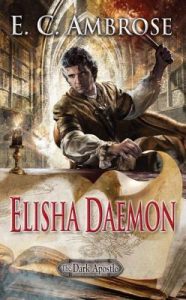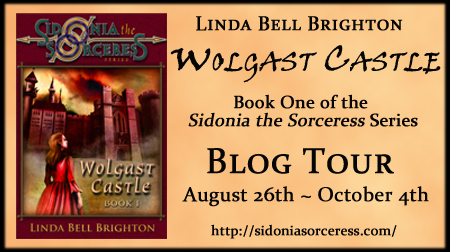
[Excerpt] Elisha Daemon by E. C. Ambrose — CORRECTED
In this fifth and final installment of The Dark Apostle, barber-surgeon-turned-sorcerer Elisha must save plague-stricken England from its path of destruction–or risk succumbing to the very dark magic he is trying to eradicate.
Elisha was once a lowly barber-surgeon from the poorest streets of 14th-century London; now, he may be the most powerful magus alive. He faces the necromancers, a shadowy cult of magi who draw their power from fear and murder–and who have just unleashed the greatest plague the world has ever known upon a continent already destabilized by wars, assassinations, and religious conflict.
Empires and armies are helpless with no clear enemy to fight. The Church loses its hold upon the faithful as prayers go unanswered. Europe has become a bottomless well of terror and death, from which the necromancers drink deep as the citizens sink into despair. Elisha knows that if there is to be any chance of survival, he must root out the truth of the pestilence at its unexpected source: the great medical school at Salerno. There, Elisha might uncover the knowledge to heal his world.
But as he does, his former mentor, the beautiful witch Brigit, lays her own plague: the unfiltered power of Death within Elisha himself.
Thanks to the generosity of DAW Books, we’re pleased to be able to share an excerpt from Elisha Daemon by E. C. Ambrose, released on February 6th. Read on, and we hope you enjoy! Feel free to share your thoughts in the comments below!
Chapter 1
Elisha’s eyes flared open in the night as another death suffused him with strength. He lay in a narrow vale of the mountains north of Venice, his breath blowing out into chill clouds, snow gleaming on the peaks all around him and dusting his fur-lined cloak. The mancers had chosen this vale for its desolation and utter lack of habitation, seeking a place where no one had died, and thus, Elisha’s power was at its weakest. All of that had changed with the advent of the pestilence that now assailed the little enclave, pilgrims brought there by the mancers’ promise of miracles, and held there by the grip of winter and the inevitability of death. The sky overhead wheeled with bright stars, and the Valley of the Shadow flickered, accepting the transit of the dead. For days now, the Valley had never closed, but pulsed around him like an aching wound, anchored by the constant stream of the dying. Jittery with power, Elisha rose and shook the snow from his cloak, wrapping it around him as he stalked among the sleeping and the dead. Even when no one spoke, he heard a windy whisper all around him, the distant chorus of the dying, the growing rumble of death triumphant.
Braziers of glowing coals and fire circles radiated feeble warmth in the huddled camp. Hundreds of pilgrims lay in the mountain vale, packed beneath rooftops hastily constructed from the lumber carried there by the mancers who discovered the place. The mancers meant to build a convent of the Blessed Mother: the young and beautiful sleeper who gave birth to a miraculous child and awakened at last from her holy rest. Brigit. Queen of England, ruthless witch, the woman Elisha once believed he loved, and now they called her “blessed”. After he had defeated the mancers who brought her to the vale and wrested away the baby they hoped to use against him, her handmaiden, Gretchen, had taken her away down the mountains. Now, Elisha alone of all the witches remained with the pilgrims as they fell ill and died. The pilgrims’ tales told him how far this sickness spread and how fast. Did the dying that spread throughout Europe keep Brigit awake as well? Did it stir her to remember what she had been and return the bright and dangerous light to those vacant green eyes?
Prayers and weeping echoed from either side as he stepped carefully between the bundled forms. A cup of wine might settle his spirit and allow him to sleep.
“Sir! Doctor!” called a broken voice, and Elisha turned. “Please, sir, it’s my daughter.” A man knelt not far from the chapel where Brigit’s child had been born. He held up his clasped hands, pleading, and Elisha recognized the father he had met on his journey here, a wiry tradesman from the heart of Italy. Another man whose child was dying. Elisha’s throat constricted, dreading what he must see, but he worked his way closer, taking up a lantern on the way, a shaky pool of light that carried him through the darkness.
The man’s daughter lay shivering, her forehead glossy with sweat, her thick blond hair matted to coils by her restless tossing. Elisha set down the lantern and knelt beside them. At his touch, she jerked convulsively, barely aware of their presence. The chill shadow of death lingered over her, the maelstrom of the Valley waiting to take her away.
“Can you help her?”
Smoothing back her hair, Elisha unstoppered the waterskin that always hung at his side and gave her a few sips. When he first met this family, he had used his power to extend the heat of a campfire, sharing the warmth with the pilgrims around him. This little girl had woken talking about a beautiful dream of sunlight and joy. Now, on this darkest of nights, he sent her the comfort of his hands, grateful, at last, for the cold that his power gave him, the cold power to soothe a fever. She sighed and drank a little more. A dark bulge marked the side of her throat.
The father took her hand in his, clutching her, his head bowed as he spoke. “I know the Lord would tell us not to beg for miracles, sir, but, if you could— know that you have the healing touch.” His voice broke again, and the man crumpled over his child, shrinking from his audacity.
One more time, Elisha sent his awareness deep, fusing his medical knowledge with his magical strength, that too-eager surging of chilly death. Fever shook her limbs— that, he understood. The nodes swelled up at her groin and armpits into these black masses, dark and ugly against her pale skin, her body ached, and her stomach churned with nausea. Any single symptom he might have thought to treat, but the tangle of them together was an evil he had never known. Elisha, too, hung his head. “This is not for me to heal.” Bitterness stung his throat and nostrils.
“But all of the priests have left us.”
“They were not priests,” Elisha said, weary of explaining.
The father flicked him a glance. “Not even one? And the nuns, too?”
“Charlatans, here to take advantage of you and all the pilgrims.” Necromancers, here to witness the birth of the child they hoped to use for their own purposes, here to celebrate the chaos and suffering of the sickness they knew was coming.
“I have been a sinner, of course, but she’s only a child. Why would God take her from me? Why would He take any of them?” He lifted his head.
Why indeed? In the week since the mancers’ departure, hundreds had already died: men, women, children lay buried in snow at the far end of the vale and a beaten track showed where they had been carried to their graves. The deaths started slowly, then spread quickly throughout the camp as Elisha and the other doctors expended their stores of herbs and poultices and tried every remedy they knew. Nothing worked.
“Perhaps the Holy Father at Avignon can intercede for us, do you think? Surely, the Pope himself must have the ear of God.”
Twenty years ago, Elisha had become convinced that God wasn’t listening. God did not hear the prayers of mothers in childbirth, of husbands, brothers, wives. He ignored the pleas of soldiers on the battlefield and those of prisoners who longed to be set free. This father prayed for hope, and his prayer, too, would go unanswered. “I wish I knew,” Elisha said at last.
“But you have power!” The father’s eyes flashed in the lamplight. “You have gifts, you have strengths that other people do not have— have seen it. If God has given this to you, then why? If not to save the children, why do you have it at all?”
The fury in the father’s voice stung him, his own questions lashing back at him in his helplessness. Elisha recoiled from the anger that spilled into the night and rippled along the fevered body of the child they both knelt over and worried for. He knelt there as a soldier on the battlefield, confronting this disease, but the man was right in his own way: the other doctors could do nearly as much as Elisha could to ease the suffering. His gifts, his strengths must be for more than this. His power must be put to use in other ways. He was a soldier no longer, and he must take this battle to the generals if he was to have any effect at all. He could not save this girl, but if he found the right weakness, if he tracked this disease to its source and stopped it spreading, he might save a thousand others.
He had to take this fight to the mancers, but how? He had a number of hints and clues, but little to connect them. Lady Katherine, the reformed mancer, spoke of a delivery from Kaffa that the German mancers had been expecting, while Count Vertuollo, the master of Rome, mentioned a man from Salerno who had acted rashly. Renart, the French mancer and architect of their attempt to claim Brigit’s child, had sneered at Elisha and gloated over the devastation to come. All of them agreed on one thing: that Elisha could not stop it. In these last few days of fighting, Elisha almost agreed. Almost. If he had not the knowledge to attack the disease headlong, could he attack its masters?
“I’m sorry. I wish I could help her.” Elisha lifted his hand and started to rise, but the girl sobbed in pain, and her father caught his wrist, tears streaking his face.
“Please, doctor.” His lips trembled. “Please, don’t be angry. I shouldn’t— didn’t mean.” He swallowed. “She is better with you here. Will you stay?”
Elisha swayed on his feet. How much longer? An hour or two? He sank down opposite her father and rested his hand on her brow. He sent her dreams and breezes, and sensed her drifting. Again, he thought of Katherine, this time reaching toward her. She had said she would conceal her sons and return to fight the mancers she once joined with. Had she learned anything that could help him to engage the mancers and stop this pestilence before it killed them all? Through all they had shared, he sought her now, letting the warmth of that relationship wash into his contact with the dying girl. For a time, they dreamed together and she rode a dappled horse whose dark mane flickered against her face until she laughed, and laughing, breathed her last. The Valley swirled to envelope her as she soared away, with the slightest smile on her face.
Elisha lay her hand across her chest and withdrew, leaving her father to his grief, the cold gripping his own heart as his breath misted the air. Then, from the Valley’s awful chorus of despair, he heard the echo of his own name and he stopped where he stood. The sensation washed through him, his breath dying in his throat. The last time that happened, his friends had died. Now, again, the Valley was calling his name.
Elisha ran through the camp, leaping the pilgrims and dodging their fires, his senses extended and searching. Urgency pulsed at his heart, but he would not abandon these people as the mancer-priests and their false virgin had done. There! He located that particular blend of knowledge, confidence, and helplessness that must ring from his own presence. Beneath an awning of blankets slung up against the snow, he found Imelda, the woman doctor who led their efforts against the pestilence. Elisha dropped down beside her, but the force of his need had already woken her. She rubbed the sleep from her eyes. “Si, Dottore. What is it?” Her voice came out on a sigh.
“Imelda, I’m sorry, but I have to go. Will you stay and minister to the pilgrims?”
She stared up at him, and her hollow cheeks and shadowed eyes suggested she wished she, too, could escape. “I do not know what there is to be done, but I will do it.”
He gave her shoulder a squeeze, sending gratitude and comfort, then hurried from the heart of camp to a sheltered boulder where none would see him go. Guilt stabbed at him— these people depended upon him— but they were not the only ones.
Elisha opened himself to the call that sang through the Valley, stepping from the cradle of death into the void. It embraced him with fire.
“Elisha, thank God,” Katherine whispered through him, beside him, all around him, the heat of her living presence warping the flicker of the Valley. Glints of silver showed in her dark hair, and longing in her eyes, a handsome woman a few years older than himself.
He caught her hands, the voices of the dead pounding against his ears and thrumming in his heart.
“Then you heard my call.”
“How could I not?”
Her face lit, her silvered hair flickering and cheeks aglow beneath her gleaming eyes. “You are never far from my thoughts. I hoped the same was true for you.”
At that, he faltered, almost releasing her, and the current of her disappointment washed over him. “I know,” she said. “I know that you are not for me, but still—” She lost her smile and her grip strengthened. “You must tell me what you need, but first, I have need of you— we all do.”
“Of course. Where are we going?”
“To Sinsheim, there’s a riot.”
He slid from the Valley beside her, his fingers entwined with hers, and stepped into a chaos of anger and an echo of steel. The rafters of a gloomy chapel rose up around them, the walls pierced with narrow windows, the stonework red and German in the glow of a single candle. With a streak of darkness, the Valley flared again nearby, a man screaming as he died. Others wailed in pain and panic. Somewhere a child cried. Instinct tugged him in that direction but Katherine clung to his hand.
“This is a chapel in a town two days’ ride from Heidelberg. We’ve been fighting, tracking the mancers, Daniel and Harald and I, but they know about us and they are working against our allies.”
It took a moment for Elisha to place the names: Daniel, a foreman at Katherine’s salt mine, had aided Elisha and Katherine in freeing her sons from the mancers; and Harald, who worked as Queen Margaret’s assassin, supported Elisha in the fight that followed.
“The flagellants are back, and in force. Elisha—” She shook her head. Her muscles trembled with the strain, her eyes rimmed with shadows. “You know about the pestilence? There’s rumors, terrible things, if it were just the mancers, I’d know what to do.” Breaking off, she pressed her free hand to her chest and leaned into him. “We have to stop them, before they slaughter everyone.”
“What—”
The door crashed open and a trio of men staggered inside. “Are there any here?” The leader shouted. “You!” he brandished a bloody sword at Elisha. “Recite the Lord’s prayer.”
Elisha’s left eye traced the spirals of death that coiled around the man’s blade. “Pater Noster qui et in caelis—” It came out in Latin, Thomas’s voice echoing in Elisha’s memory. Thomas, the king who prayed over him.
The man blinked, then gave a sharp nod. “Good— you’re one of us. Come on, then, the Jews are getting away!”



